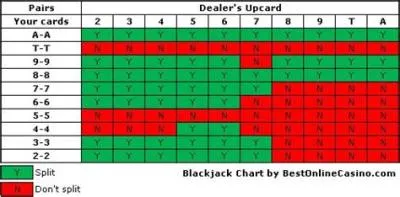What number should you split in blackjack?

Why not split tens in blackjack?
If you split the 10s one time, you stand to win 63% and lose 37% on each split hand. That's a significant decrease in the number of hands won simply because if you split, you will often end up with less than 20 on both hands.
2023-09-26 07:52:24
Should you split 10 blackjack?
When it comes to splitting 10s in the game of blackjack, the bottom line should be: Average players should never split and should always stand on 20. Card counters
Card counters
Card counting is a blackjack strategy used to determine whether the player or the dealer has an advantage on the next hand. Card counters are advantage players who try to overcome the casino house edge by keeping a running count of high and low valued cards dealt.
https://en.wikipedia.org › wiki › Card_counting
Card counting - Wikipedia
will sometimes split in ten-rich decks. Smart tournament players will sometimes split when they need to bet more chips, especially if it's the last hand.
2023-08-25 21:53:08
What are bad numbers on blackjack?
If a player is dealt a pair of eights, the total of 16 is considered a troublesome hand. In fact, the value 16 is said to be the worst hand one can have in blackjack.
2023-06-08 20:16:59
What are the best numbers in blackjack?
It is common practice to hit on eight or less, but stand on anything 12 or higher. When the dealer has a three, you should hit on anything eight or below and 12, while standing on anything 13 or over. If the dealer has a two it is best to hit on nine or less and stand on anything 13 or over.
2023-01-19 13:26:12
- korea national soccer team
- tower of fantasy max level
- pokemon scarlet violet skin tones
- when does pokemon bank become free
- need for speed unbound tesla
- 0 3125 inches to fraction
- zeus download
- nightfall rank 1
- Recommended Next Q/A:
- Is the oppressor mk1 fast?



